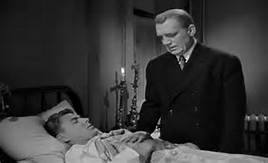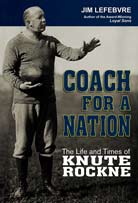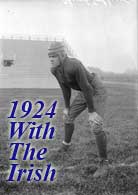“I’ve got to go, Rock. It’s all right. I’m not afraid. Some time, Rock, when the team’s up against it; when things are wrong and the breaks are beating the boys – tell them to go in there with all they’ve got and win just one for the Gipper. I don’t know where I’ll be then, Rock. But I’ll know about it, and I’ll be happy.”
By Jim Lefebvre
It’s been called the most notable speech in the history of sports movies. And not just because it was delivered by an actor who became president of the United States.
The phrase “win one for the Gipper” entered the American lexicon immediately after it was uttered by Ronald Reagan in the 1940 Warner Bros. biopic “Knute Rockne All American” – and it has remained there ever since, used to refer a variety of victories on behalf of countless causes, individuals, and groups.
In reflecting on the 75th anniversary of the movie’s release this week, I pondered a question I often hear when traveling the country, speaking about Coach Rockne’s life and legacy.
Did it really happen? Did Gipp really make such a request?
The answer is simple – we can’t possibly know exactly. Yes, Rockne and George Gipp had a private conversation while Gipp lay on his deathbed in South Bend in December of 1920. And, yes, eight years later, when Rockne’s weakest Notre Dame team, with two defeats already in the books, was facing another possible loss against Army at Yankee Stadium, Rockne gave “the speech” to rally the troops to a 12-6 victory over the Cadets. (Though the Irish dropped their final two games to finish 5-4.)
But were those Gipp’s exact words? The words Rockne put into his autobiography, and Hollywood made famous?
I usually point out that Rockne had a flair for the dramatic, and could be counted on to embellish and varnish stories to fit the occasion. His realm was not one of the fact-bound historian or journalist, but of the inspirational motivator.
Some say Gipp would have never referred to himself as “the Gipper.” Yet that can’t even be stated for certain. Rockne had a way with his players, with numerous little nicknames and inside jokes. He may have referred to Gipp as “the Gipper” in private conversations, or even in team activities that went unrecorded.
Others question whether Gipp would have been focused on future Notre Dame football teams while facing his imminent death.
Perhaps it was Rockne who made the suggestion, something along the lines of “We’ll never forget you, George. You gave your all every time you stepped on the field. I promise you, from this day forward, we’ll continue to show that fighting spirit in every game I’m privileged to coach.”
Not quite as riveting a Hollywood scene, is it?
I think the larger theme is that Rockne was deeply affected by the death of the greatest athlete he would ever coach. There is no overstating what Gipp accomplished on the field of play (his lifestyle off the field notwithstanding). Rockne wanted to honor that level of accomplishment, and make Gipp’s life matter to the football players who followed him at Notre Dame.
So, while I don’t believe Rockne concocted Gipp’s death-bed request out of whole cloth, I think his ultimate message to his players was this: none of us is guaranteed another day of life…make the most of this opportunity…use the talents you’ve been given…find a way to lift up your teammate when he needs it the most…make this the day you contribute to a great team effort…to a victory won by the spirit of Notre Dame.
Or, put another way, win one for the Gipper.







